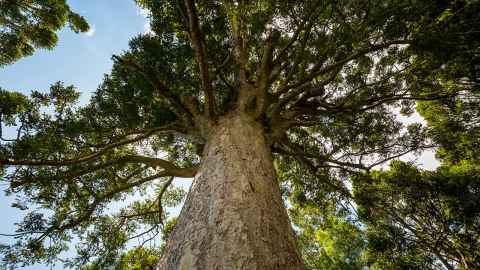Programme overview
The MEcology is a focussed programme enabling you to connect with industry and government partners and agencies while developing your career in professional ecology.
Study a diverse array of expert specialisations, gaining knowledge in population and community ecology, global change, biosystematics, ecophysiology, ethics, socio-ecological systems and more.
Entry to the Master of Ecology is through a recognised undergraduate degree in biological sciences, ecology, environment, or marine science.
Find out what our campus locations and facilities have to offer in these videos.
Programme structure
The MEcology is an 18-month, 180-point programme with the option of starting in Semester One or Semester Two. It is completed over three semesters full-time, with part-time options available.
The programme will be delivered through lectures, seminars, laboratories, fieldwork and supervised research. Fieldwork will be a component of some courses and may also be part of the 60-point dissertation.
The programme includes 120 points of taught courses and a 60-point research dissertation.
Explore the full programme structure in the Curriculum Catalogue
You'll also need to meet other requirements, including time limits and total points limits. See Postgraduate enrolment.
Subjects available in this programme
- Ecology
2026 entry requirements
My highest qualification is from:
Programme requirements
Minimum programme requirements
Minimum requirements listed here are the likely grades required and do not guarantee entry. We assess each application individually and applicants may require a higher grade to be offered a place.
-
Study optionTaught 180 pointsGrade requiredGPA Grade Point Average 4.0
A Bachelor of Science, or a Bachelors degree with a relevant major or specialisation.
Further programme requirements
Taught 180 points
The minimum Grade Point Average to gain entry is 4.0 or higher in 60 points above Stage II.
You must also have passed at least 15 points from BIOSCI 333, 334, 394, or equivalent prior study.
Alternatively, you must have completed a Bachelors degree and passed 60 points toward the Postgraduate Diploma in Science with a GPA of 4.0 and a relevant specialisation (provided that the postgraduate diploma has not been awarded).
Other pathways to study
If you do not meet the above entry requirements, but have other relevant experience and think you would be successful in postgraduate study, please contact us to discuss alternative pathways into our programmes.
Programme requirements
Minimum programme requirements
Minimum requirements listed here are the likely grades required and do not guarantee entry. We assess each application individually and applicants may require a higher grade to be offered a place.
-
Study optionTaught 180 pointsGrade requiredGPE Grade Point Equivalent 4.0
A Bachelor’s degree majoring in Biological Sciences or an equivalent subject from a recognised academic institution.
-
QualificationIELTS Academic International English Language Testing SystemScore required6.5
No bands below 6.0.
Further programme requirements
Taught 180 points
You must have completed an undergraduate degree in Biological Sciences or an equivalent subject at a recognised university (or similar institution) with a GPE of 4.0.
How much does a Master of Ecology cost per year?
2026 fees
- Domestic students
- NZ$11,545.20*
- International students
- NZ$55,484*
Fees are set in advance of each calendar year and will be updated on this website. Fees are inclusive of 15% GST, but do not include the Student Services Fee, course books, travel and health insurance, or living costs. Amounts shown are indicative only. In addition to the tuition fees, there is a Student Services Fee of $9.44 per point, estimated at $1,699.20 for full-time study (180 points). Fees will be confirmed upon completion of enrolment into courses.
*Please note: amounts shown are indicative and estimates only.
Find out about financial support information
Scholarships and awards
Find out about the scholarships you may be eligible for.
Student loans and allowances
Are you a New Zealand citizen or resident? You could be eligible for a student loan or allowance.
Cost of living
Get an idea of how much accommodation and general living in Auckland will cost.
Key dates
Please note: We will consider late applications if places are still available. International students should start the application process as early as possible to allow sufficient time to apply for a visa.
Application closing dates
- Semester One 2026
- 8 December 2025
- Semester Two 2026
- 8 June 2026
Start dates
Here are the start dates for the programme.
| Semester One | Starts – 2 March |
|---|---|
| Ends – 29 June | |
| Semester Two | Starts – 20 July |
| Ends – 16 November |
| Semester One | Starts – 1 March |
|---|---|
| Ends – 28 June | |
| Semester Two | Starts – 19 July |
| Ends – 15 November |
Other important dates
See important dates for the academic year, including orientation, enrolment, study breaks, exams, and graduation.
Where could this programme take you?
The Master of Ecology aims to prepare career-ready graduates in the field of professional ecology. Graduates may find employment as professional ecologists in private environmental/ecological consultancies or as business advisors, within local and national government agencies, and in scientific research.
Student career planning service
Once you become a student at the University, you can get help with planning and developing your career from Career Development and Employability Services.

Read about the MEcology programme in detail and discover whether it's the right study path for you.
Find out moreDo you need help?
Can’t find the answer in AskAuckland?
Need to speak to someone?
You can phone us directly.
- Auckland:
- (09) 923 5025
- Outside Auckland:
- 0800 61 62 63
- International:
- +64 9 373 7513


